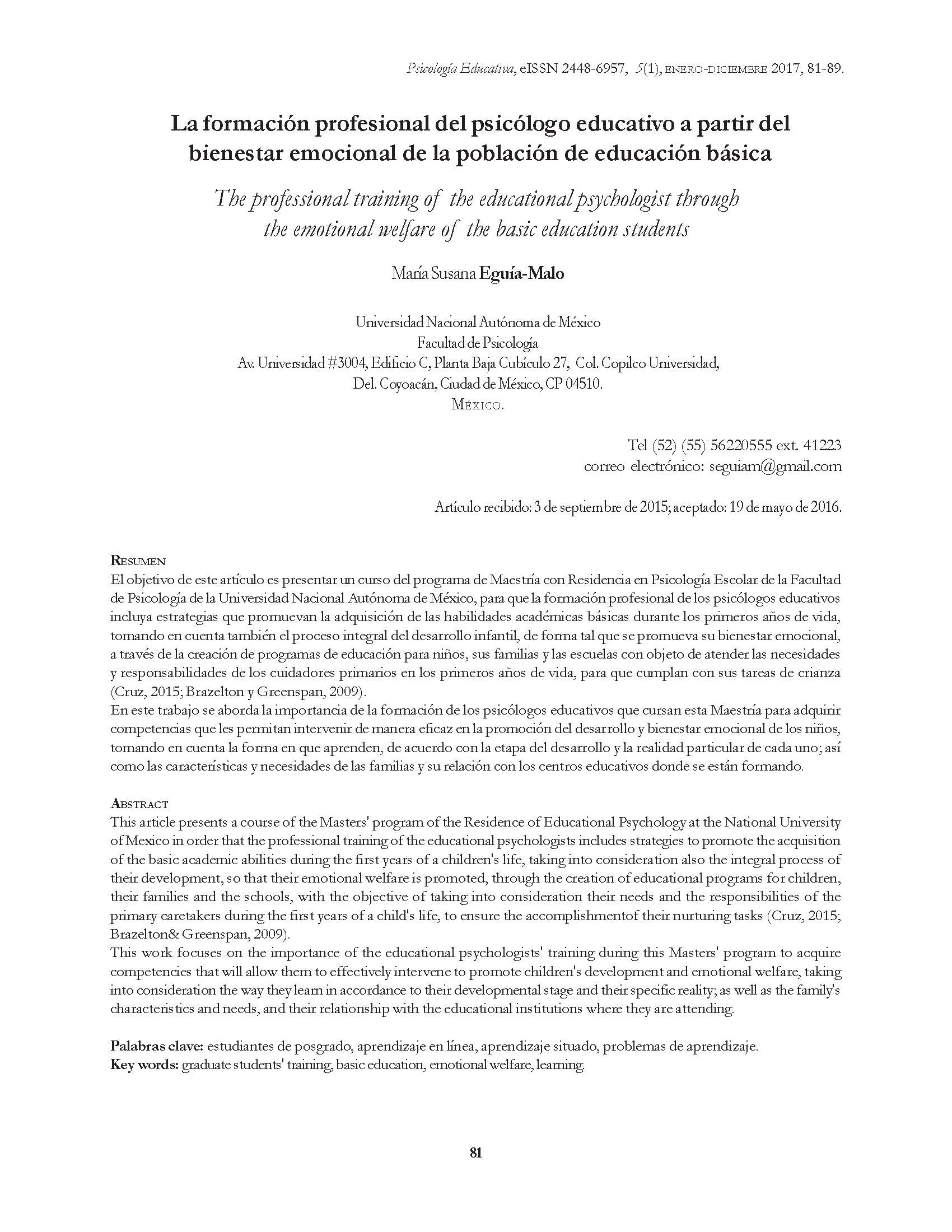Abstract
This article presents a course of the Masters' program of the Residence of Educational Psychology at the National University of Mexico in order that the professional training of the educational psychologists includes strategies to promote the acquisition of the basic academic abilities during the first years of a children's life, taking into consideration also the integral process of their development, so that their emotional welfare is promoted, through the creation of educational programs for children, their families and the schools, with the objective of taking into consideration their needs and the responsibilities of the primary caretakers during the first years of a child's life, to ensure the accomplishmentof their nurturing tasks (Cruz, 2015; Brazelton& Greenspan, 2009).
This work focuses on the importance of the educational psychologists' training during this Masters' program to acquire competencies that will allow them to effectively intervene to promote children's development and emotional welfare, taking into consideration the way they learn in accordance to their developmental stage and their specific reality; as well as the family's characteristics and needs, and their relationship with the educational institutions where they are attending.
References
Belsky, J. (2007). Experiencing the LifeSpan. New York: Worth Publishers.
Brazelton, B. y Greenspan, S. (2009). Las Necesidades Básicas de la Infancia. Lo que cada niño o niña precisa para vivir, crecer y aprender. Barcelona: GRAÓ.
Copple, C. y Bredekamp, S. (2009), Developmentally Appropriate Practice in Early Childhood Programs. NAEYC: Washington.
Cruz, N. (2015). Programa "Bienestar Emocional": una experiencia con familias y educadoras. Reporte de Experiencia Profesional, Maestría en Psicología. México: Facultad de Psicología, UNAM.
Flores, R., Cabrera, D., Rodríguez X., Garduño, E., Vasconcelos, M. y Méndez, V. (2011). ¿Cómo educar a hijos e hijas sin lastimar? Manual para mamás, papás y cuidadores de niños y niñasmenores de 10 años. México: Facultad de Psicología, UNAM.
Flores, A. y Gómez, L. (2013). ¿Qué es la disciplina positiva y cómo ayuda al bienestar y educación de los niños y niñas menores de 8 años? En Seda, I. y Pastor, R. (eds.) Perspectivas múltiples en el cuidado y bienestar infantil: Investigación, teoría y práctica fundamentada. México: UNAM.
Linder, T. (2008). Transdisciplinary Play-Based Assessment.
Baltimore: Brookes Publishing Co. Vol. 1 y 2.
Macotela, S. (2007). Replanteando la Formación de Psicólogos: un Análisis de Problemas y algunas alternativas de solución. Enseñanza e Investigación en Psicología. 12(1): 5-25.
Martínez, R. y Becedóniz, C. (2009). Orientación Educativa para la vida Familiar como medida de apoyo para la Parentalidad Positiva. Intervención Psicológica, 18(2), 97-112.
PREPSE (2014). Programa de Residencia en Psicología Escolar. Coordinación de Maestría y Doctorado en Psicología, UNAM.
Riley,D., San Juan, R.,Klinkner, J. y Ramminger, A. (2008). Social & Emotional Development. Redleaf Press, St. Paul, Min.
Solloa, L.M. (2001). Los trastornos psicológicos en el niño.
México: Trillas.
Sroufe, A. (2000). Desarrollo emocional. La organización de la vida emocional en los primeros años. Oxford

This work is licensed under a Creative Commons Attribution-NonCommercial-NoDerivatives 4.0 International License.
Copyright (c) 2024 Universidad Nacional Autónoma de México


